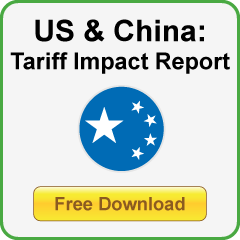Tariff Tracker: Recreational Boating Industry Is Rocked by the Rough Seas of a Trade War
by Sarah Schmidt
August 21, 2018
The recreational boating industry is facing tariffs on multiple levels, both in the materials used to construct boats and boat parts and the boat parts and boats themselves. These tariffs not only raise costs; they also increase uncertainty—a development that is especially hard to swallow for the US industry, which has posted a strong recovery since the significant downturn that followed the Great Recession.
US Boating Industry Hit with Tariffs on All Sides
First, the US industry is feeling the effects of US tariffs imposed on imported steel and aluminum (with a few exceptions), as well as additional countervailing duties on common alloy aluminum sheet from China, which were initiated in response to a recent finding of dumping on the US market. Although US boat manufacturers source a majority of their aluminum from domestic sources, these tariffs have affected the global market and distorted prices so that the cost of even US-made aluminum has increased substantially, pulling the price tags of boats made with the material up along with it.
Retaliatory tariffs from Canada, Mexico, and the European Union as well as US tariffs on marine products from China have put the industry under further stress. Overall, these tariffs are raising the costs of production and the sticker price of any recreational boat. Long term, these additional costs could result in decreased boat sales and orders, prompting manufacturers to slow production and cut jobs.
Some of these issues are already being realized. In a recent op-ed piece, the CEO of Correct Craft, Bill Yeargin, wrote, “Our deepest fears are already setting in. Distributors from around the globe are canceling orders at a concerning pace and we’re worried about the impact these canceled orders will have on our employees.” In reference to the retaliatory tariffs from Canada, Mexico, and the EU, Mr. Yeargin said, “The boating industry is the only recreational industry being slapped with retaliatory tariffs by all three of those jurisdictions.”
Canada, Mexico, and the EU Retaliate with Tariffs on Recreational Boats
In response to steel and aluminum tariffs imposed by the US in June 2018, Canada, Mexico, and the EU levied tariffs of 10%, 15%, and 25%, respectively, on imports of US-made recreational boats. The last of these tariffs to go into effect – those from the EU on July 2 – were called a “showstopper” by Stephen Hesse, the president of Chris-Craft, in a recent article.
Canada is the largest recipient of US boating product exports. Additionally, the majority of recreational boats sold in Canada are imported from the US. Because the US boat industry is closely tied to the Canadian boat market, the effects of the tariff will be felt on both sides of the border.
Trade Relationship with China Grows More Complicated
After China responded to the aluminum and steel tariffs with surtaxes of its own on US goods, the US announced a 25% tariff on nearly 300 marine related products. The products include marine components, propulsion systems, and navigational equipment. Many of these tariffs went into effect on July 6, 2018.
Unless US boat manufacturers are able to obtain an exclusion from the US government, these tariffs will increase the costs of manufacturing boats, and those expenses will likely to be passed on to the consumer, causing boat prices to hike.
Additionally, the US government has threatened more tariffs against China, stemming from the Chinese response to the July 6 tariffs. Among the list of products that would be part of the $200 billion in potential tariffs are a number of marine related products, as well as recreational boats themselves.
Finally, it appears China has recently added recreational boats imported from the US to its list of trade targets. If this comes to pass, China’s retaliatory tariffs would join those of Canada, Mexico, and the EU and add further pressure to the recreational boating industry.
Looking ahead, the final effects of all of these tariffs are still unknown, and that’s likely to remain true for some time. But, as the tariffs continue to mount, experts will increasingly wonder if the industry can ride out the storm unscathed.
To Learn More
Want to learn more about tariffs and the industries they'll impact the most? Download the Freedonia Group's new white paper for the latest insights from experts.
About the Author
Dan Debelius is an industry analyst at The Freedonia Group, where he writes industry studies on the US consumer and commercial goods market
Have unique research needs?
Freedonia Custom Research listens intently to your needs and objectives. Then we work diligently to define and deliver a service to meet them.Subscribe to Our Blog
Stay up to date with the latest information about new market research and news in areas relevant to your business from our analysts and team members.Freedonia Group Blog Subscription
Provide the following details to subscribe.
